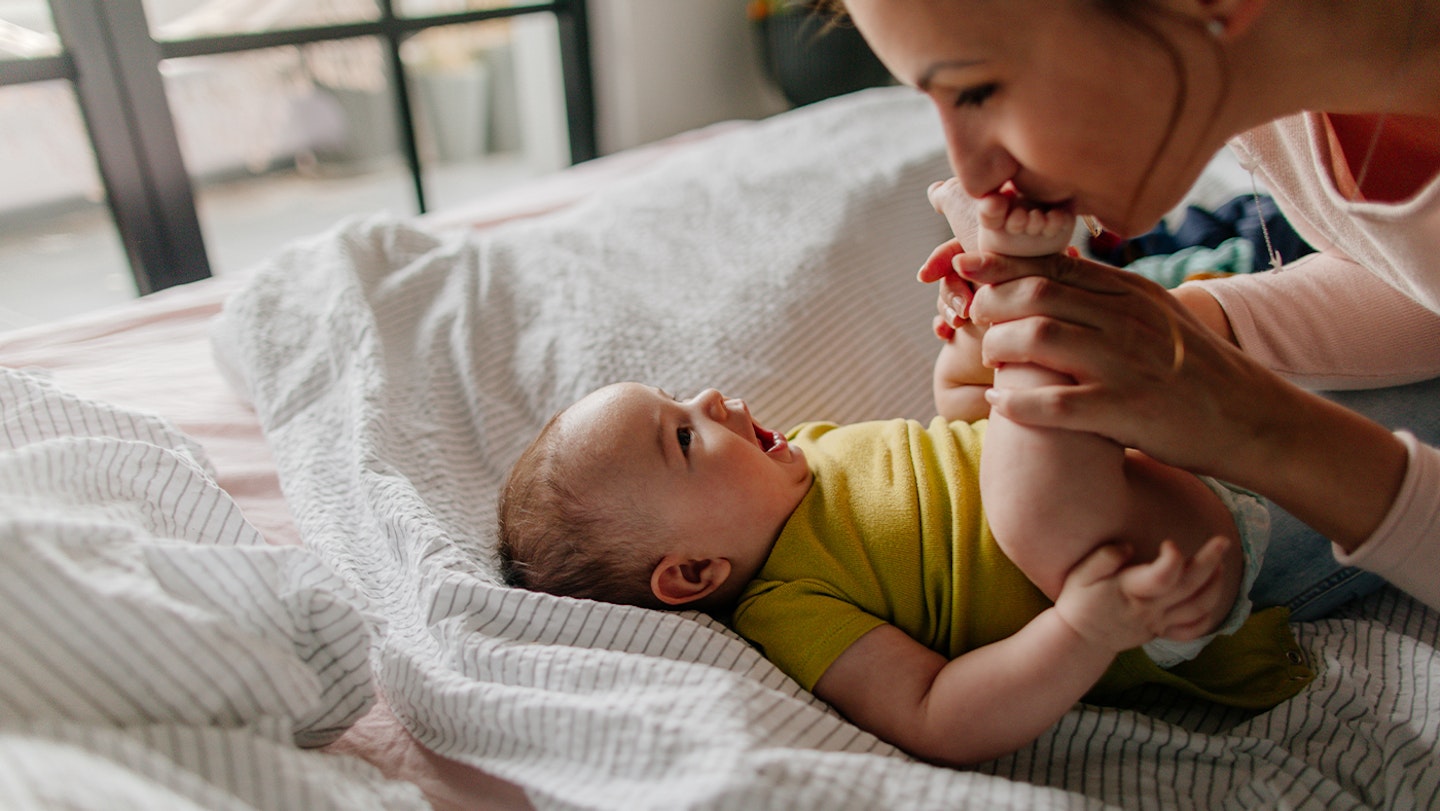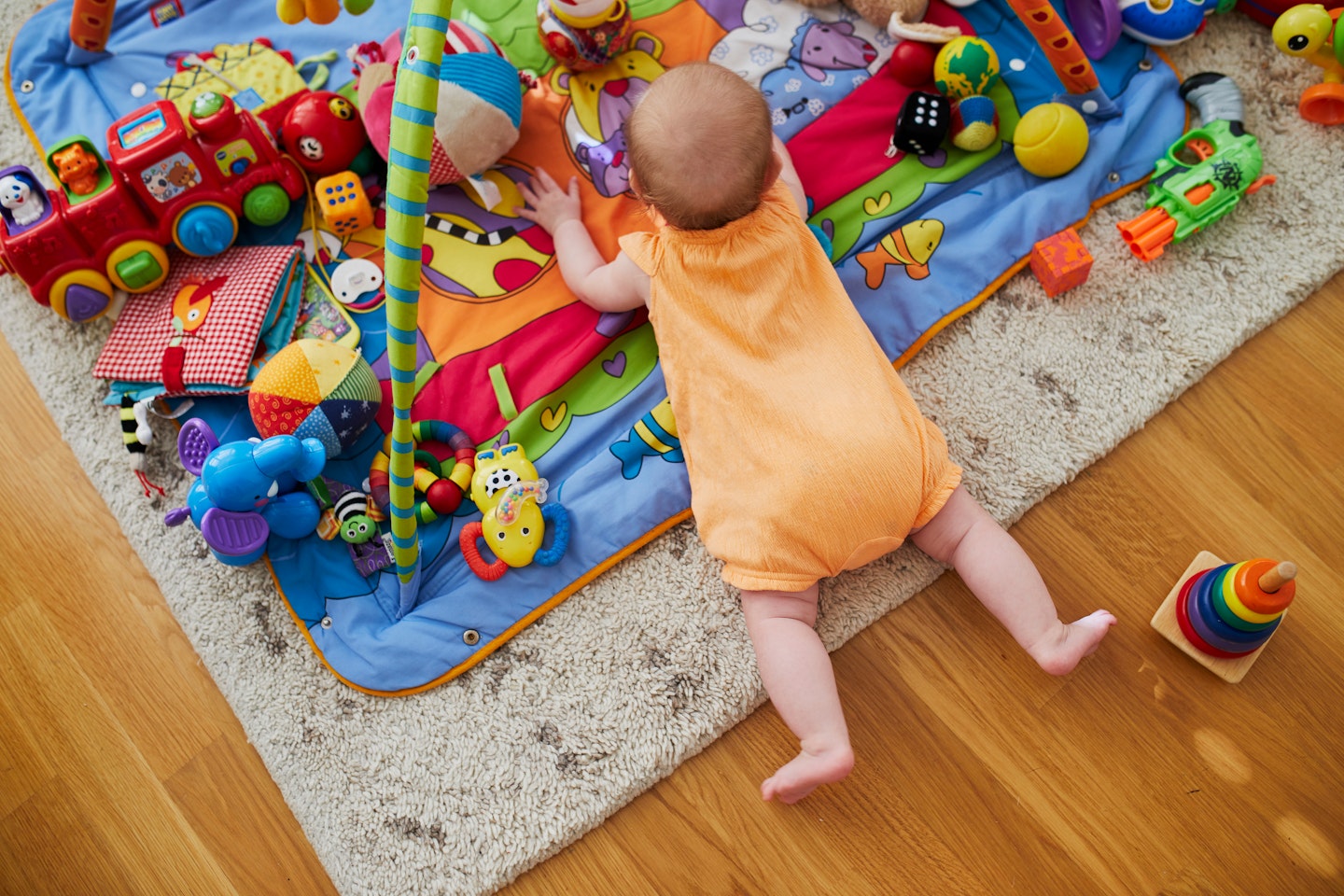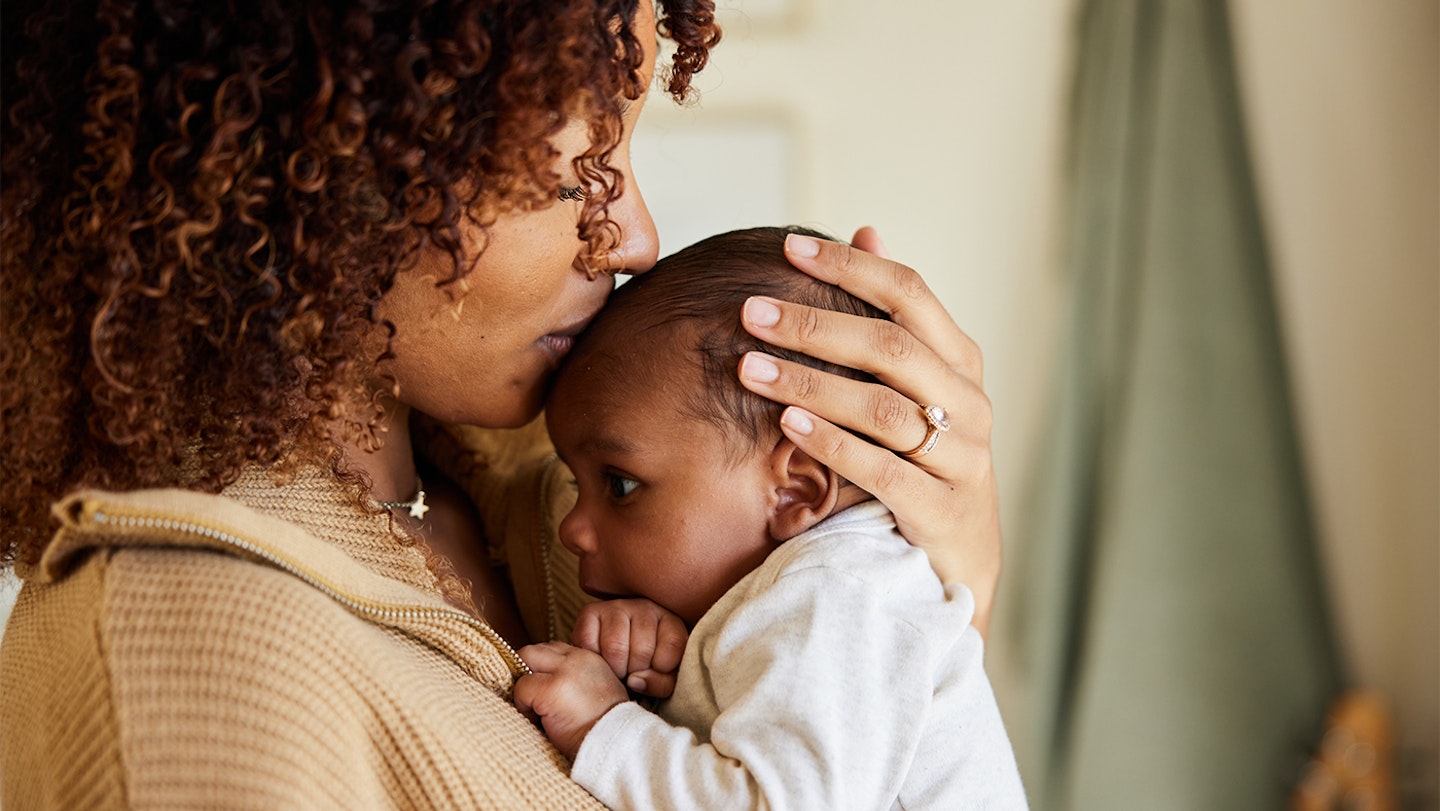Medically reviewed by expert midwife, Marie Louise, AKA ‘The Modern Midwife’.
If you've got a 10-week-old baby, you'll no doubt be noticing some pretty adorable characteristics and baby developments this week. As their eyes develop, they're taking much more of an interest in you and your facial expressions which will probably encourage a first smile from them. Physically, you'll also be noticing some serious growth as they hit their first growth spurts.
Ten weeks into your baby’s week-by-week development, you’re sure to have a lot of questions about your baby. We’ve rounded up everything you need to keep in mind during week 10 including your baby's development milestones and what you can expect.
10-week-old baby development and milestones

10-week-old baby physical development
Between the 9-week old babyand 10-week mark, you will have noticed a couple of growth spurts, with your baby growing two inches and putting on 2-3 pounds since being born. "Babies grow rapidly during this period, gaining weight and length. Regular well-baby checkups with a paediatrician can ensure that the baby is meeting appropriate growth milestones." Says Midwife Marie. As they’re starting to outgrow their clothes and their Moses basket, it’s time to move up a size. Try keeping the Moses basket inside the cot for a few nights to get your baby used to their new surroundings.
At ten weeks, your baby will be filling out more, and even if their legs and arms are chubbier than you expected, it’s all perfectly normal. Your baby will be starting to realise they can use their arms and hands, finally connecting that they can look and touch things at the same time. That means a lot of grabbing is coming your way.
As your baby enters month three, they should be able to hold their heads up more confidently this week, although not for too long. According to Midwife Marie, the 10-week mark is all about that head control. "10-week-old babies are developing better head control, and some may start to show early signs of rolling over. They may also engage in more purposeful limb movements," she explains.
If they’re having difficulty using their neck muscles, lie in front of them when they’re on their tummy and encourage them to look up at you. As baby develops into week 11, you'll notice their neck strength begins to increase.
10-week-old baby cognitive development
"At 10 weeks, babies start to show increased awareness of their surroundings, responding to familiar voices and faces. They may also begin to track objects with their eyes." Says Midwife Marie. As your baby realises they can use their legs and arms to kick and punch, they’ll start to be more co-ordinated and grab at everything. This is a great time to introduce toys to help hand-eye coordination more at playtime.
Playtime is also something your baby is starting to engage with more; they will love all of the bright colours and new sounds. Allow things to dangle on their pram or in their cot, it will help develop their 3D vision and encourage them to grab at them.
They’re also loving music right now and will have notably different reactions depending on what type of song you play. Keep singing to them and playing gentle lullabies followed by faster songs to notice their excitement, you may even encourage more smiling!
How much should a 10-week-old baby be pooing?
Feeding more means pooing more, but as long as your baby is filling between one and ten nappies a day, or even once every few days if they’re breastfed, they’re usually fine. It’s not necessarily how many times they poo that matters, but more so if it’s passed easily and your baby is not in pain.
"Babies typically need changing every 2-3 hours, or more frequently if they have soiled their nappy." Explains Marie. "Maintaining good hygiene is crucial for preventing diaper rash." She continues.
If you feel like your baby doesn’t seem to be pooing enough, or you’re worried they look uncomfortable while going, your little one might be constipated and need to see a doctor.
How much should a 10-week-old baby be eating?
Growth spurts mean one thing, a lot more food. If you’re following your baby’s lead you may find them eating more, but don’t worry about overeating as they know how much they need – 5-6 feeds over 24 hours is average at this age, but every baby is different.
"If you are choosing to pump then MAM have a variety of products to help you on your journey, including their new Move Wearable Breast Pump." Explains Midwife Marie. "On average, babies at this age may feed every 2-3 hours, with each feeding lasting about 15-30 minutes." Louise adds.
A good guideline for feeding is 150-200ml per kilo of their weight, but continue to follow their lead if you’re breastfeeding – your baby will know best!
How much should a 10-week-old baby be sleeping?
According to Midwife Marie, a 10-week-old baby needs about 14-17 hours of sleep per day. That means about ten hours of sleep at night and five during the day, spread out over three naps or so. A lot of new parents will worry that their baby isn’t fitting into a certain sleep schedule, but remember, every baby is different and they’re still likely to wake up in the night for feeds at this age. "Babies at this stage tend to sleep for shorter periods during the day and longer stretches at night, with several naps during the day." Says Marie.
Your baby’s dummy may now be causing issues, as they could be depending on it to settle themselves to sleep. Try taking it out at bedtime, it’ll only fall out in the night, resulting in you having to wake up and put it back in. You may have a few restless nights, but it will be worth it in the long term. To relax your baby before bed, try feeding at about 10pm or before your bedtime to induce a nice cosy just-fed sleep. "MAM’s night soothers, which glow in the dark, are a great resource for babies around this age range as well as their night trainer cup, perfect for night-feeding." Adds Marie.
If you’re struggling to establish a baby sleeping routine, try not to worry – every baby will take their own time to settle into a routine.
Things to think about at 10 weeks
Try some tummy time with baby

With your baby more engaged at playtime, it’s a good time to focus on tummy time as Midwife Marie explains. "Incorporating tummy time into daily routines helps strengthen the baby's neck and upper body muscles." Spend at least a few minutes each day playing with them while they lay on their stomach on a mat. Not only will this encourage them to use their arms to push up and use their necks to look around, it will help your baby develop the muscles she needs to start crawling. Over the next few weeks and months work your way up to 15-30 minutes a day.
Testing your baby's muscles
This week, you may find your baby is bearing some weight on their legs. Try it by holding them upright and seeing if they can support themselves for a moment. It’s a big ask, and one you should probably only try when they’re happy and excitable, but testing out these reflexes and muscles is a great start to helping their physical development along.
What jabs should a 10-week-old baby have?
"Parents should also schedule routine vaccinations as recommended by their healthcare professional" explains Midwife Marie. You should have had your immunisation appointment at two months old, but don't worry if you’re only just fitting it in or they had to be postponed. During their appointment, they’ll receive their first dose of the 6-in-1 injection against diphtheria, hepatitis B, tetanus, whooping cough, polio and Hib (Haemophilus influenza type B).
At the same time, they'll be given vaccines to protect against rotavirus (which is a common cause of diarrhoea and sickness) and Meningococcal Group B which protects against things like meningitis and septicaemia. Their meningitis B vaccine can result in a fever, so your nurse may advise you to give your baby infant paracetamol after the vaccine.
They will receive these vaccinations by injection in their upper thigh, one in each leg. It might sound traumatic, but should only take a few seconds. The rotavirus vaccine will be given orally (a liquid dropped into their mouth for them to swallow).
What problems should parents of a 10-week-old baby be aware of?
While Midwife Marie says that parents should be aware of any signs of illness at week 10, such as fever, unusual fussiness, or feeding difficulties. "Keeping up with vaccinations is also essential." she adds.

Flat Head Syndrome: If your baby is spending a lot of time on their back, which they typically prefer to tummy time, they may be at risk of developing Flat Head Syndrome. The continued pressure on one spot of their head will cause a flat spot to appear. During playtime, let your baby spend more time on their tummy, as this will not only reduce the likelihood of this but also encourage their neck muscles to strengthen. You can also wear your baby in a sling to reduce the amount of time they spend on their backs, and increase bonding for the two of you.
Post-pregnancy sex: While you are obviously obsessed with your new baby, both you and your partner are bound to have started to miss the intimacy that came before you started this new journey. Your bond will deepen with having brought life into the world together, but it’s normal to feel a bit sad that you no longer only have each other to worry about. It’s also normal for these changes to show in your sex life, which is completely normal and extremely common. Make sure to take some time out and reconnect this week.
Postnatal Depression: Postnatal Depression can occur at any time in the first year of your baby’s life. Are you overwhelmed by guilt or feelings of failure? Do you feel like everything could go wrong and it’s all your fault? You may want to visit your doctor and talk about the possibility of postnatal depression. With one in ten women dealing with it, you’re definitely not alone. According to Midwife Marie, postnatal depression is a common concern. "Parents should prioritise self-care, seek support when needed, and communicate openly about their feelings. Re-establishing a routine can provide a sense of normality for both parents and the baby." She explains.
Lorna White is the Senior Digital Writer for Mother&Baby. After running the Yours magazine website, specialising in content about caring for kids and grandchildren, Lorna brought her expertise to Mother&Baby in 2020. She has a keen interest in a range of topics from potty training and nutrition to baby names and early development and has a wide range of experienced medical experts and professionals at her fingertips. In her spare time, she enjoys spending time with her two young sisters, dog walking and enjoying the outdoors with her family.
About the expert
Marie Louise, AKA the Modern Midwife is a qualified midwife of twelve years, a mother of two, and an author. Marie also works in partnership with leading baby product manufacturer, MAM. She is dedicated to supporting parents in navigating their parenthood journey with her range of online courses and books, whilst breaking down scientific data into a digestible form for everyone to understand.
